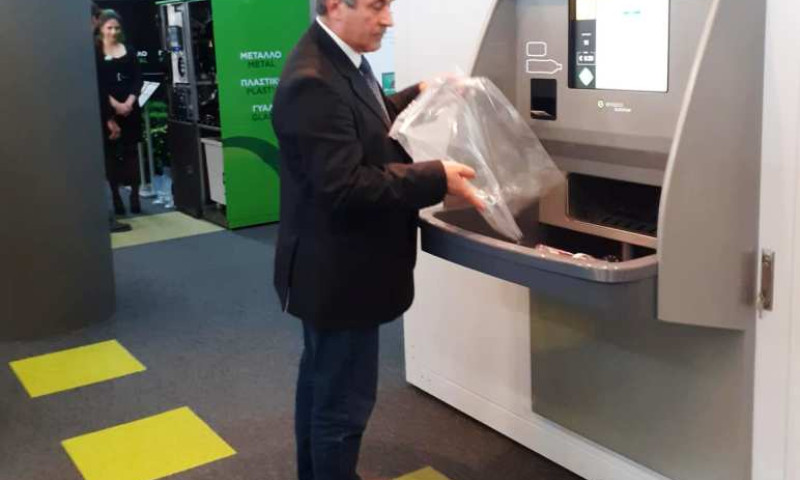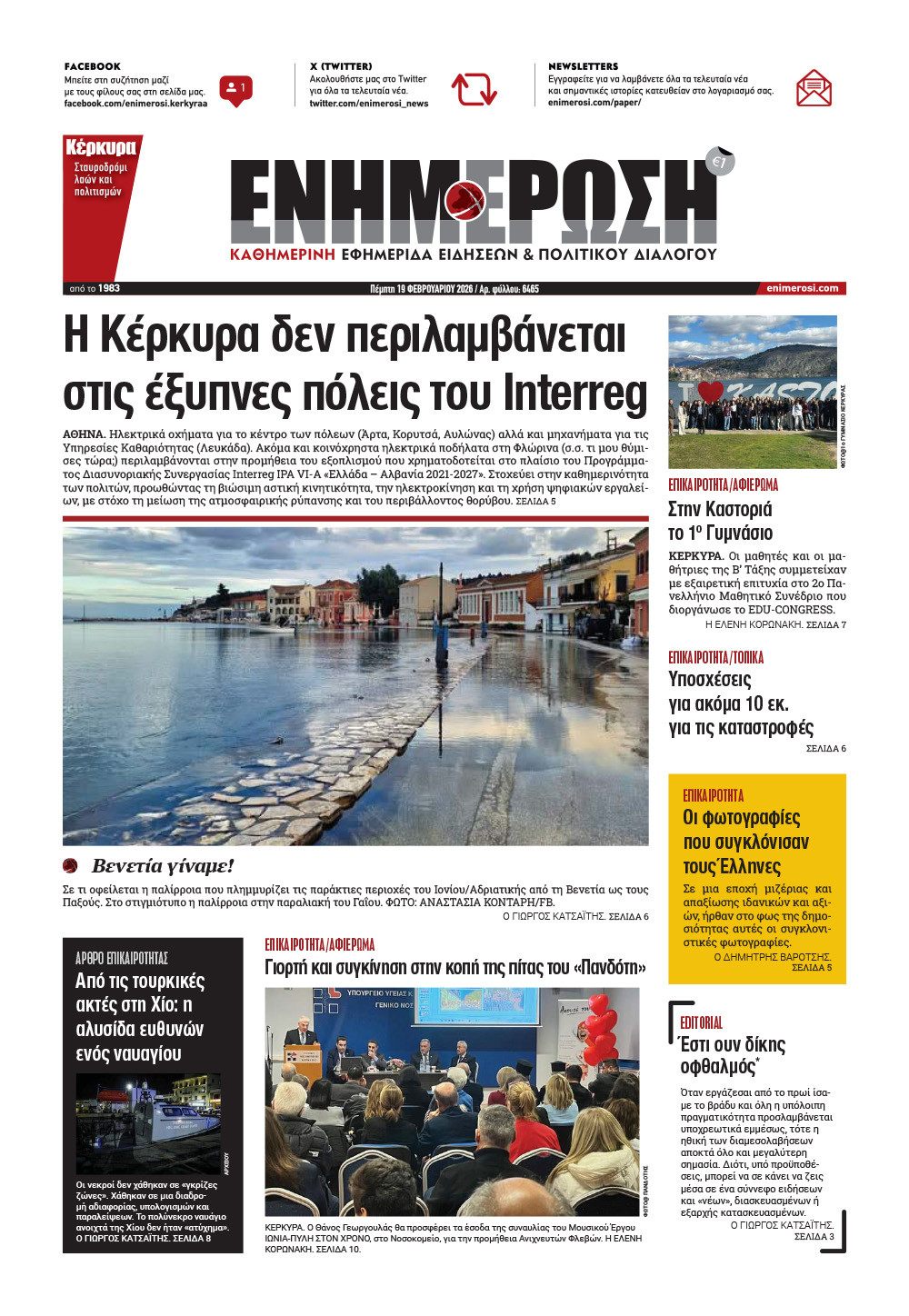Method of collecting recyclable materials in Greece is changing
 Spyros Neratzis tries out one of the ENVIPCO reverse vending machines
Spyros Neratzis tries out one of the ENVIPCO reverse vending machines
environment
06 Dec 2019
/ 07:49
ATHENS - PALLINI. Municipal Councillor Spyros Neratzis represented Corfu at the launch of the first production unit for Reverse Vending Machines under the aegis of the American Embassy.
"Things have come to a head. Recycling, the green economy and the circular economy are no longer just a trend or a line of thought - but are the only way to proceed in the future. Recycling is a social necessity and has to be a way of life for everyone," said Prime Minister Kyriakos Mitsotakis at the launch of ENVIPCO's first production facility for reverse vending machines in Greece.

Spyros Neratzis was also present at the event, which was held under the aegis of the American Embassy with the US Ambassador Geoffrey Pyatt attending. The launch was originally scheduled to take place a few days earlier but was postponed until the Prime Minister, who had been in London, could attend - an indication of the importance attached to the occasion.

The Central Corfu & Diapontia Islands Municipal Councillor and head of the 'Kerkyra Psilla' party Spyros Neratzis attended the event which drew both domestic and international attention including the majority of Government members.

The US company ENVIPCO has invested $10m in the Reverse Vending Machine Production Unit, with which, as Prime Minister Kyriakos Mitstakis said, Greece is entering new era with a new set of values involving a green economy, circular economy and recycling.
In entering the Greek market ENVIPCO is also gaining a foothold in the Balkans with an ambitious investment programme hoping for large profits. More significant than that, however, is the development of a new approach to waste management for the benefit of local communities and the planet as a whole.
Spyros Neratzis: "The method of collecting recyclable materials is changing"
Spyros Neratzis told Enimerosi that ENVIPCO's investment, in essence, changes the way that recyclable materials - and specifically plastic, glass and aluminium - will be collected in Greece.


The first to enjoy the benefits from the American company's machines will be the Municipalities of Nea Smirni and Kallithea in Athens, Andros island and the Municipalities of Nafplion and Ioannina, where 45 'kiosks' will be set up in the first phase of the project - to collect plastic, aluminium and glass.

Spyros Neratzis, who attended the event in Pallini on Thursday 5 December, told Enimerosi: "Corfu will one of the next Municipalities to have the opportunity to install the ENVIPCO machines."

"What is required is an updateof the contract which has already been signed by the previous local authority," added Mr. Neratzis. "We will shortly have three (possibly more) of these machines so that we can start reciprocal recycling."

Spyros Neratzis explained that members of the public will have a financial incentive to sort at source - for every 33 items they will receive 1 Euro either as a voucher to buy goods or to donate to charity.
"New technologies will help bring about a change in culture as regards waste management and this is the greatest benefit for all of us..."

The proposal to the Local Authority under Nikolouzos
The company 'Reciprocal Recycling AE' had proposed to the previous Corfu Local Authority that three large environmental parks be set up (approx. 2 stremma each) so that the collection of recyclable materials (plastic, glass & aluminium) could increase throughout Corfu. The cost for 12 kiosks and three parks would have been 1.2m Euros.

This leads one to ask why the 6m Euros the Ionian Islands received for waste management wasn't used. These funds have been set aside but still haven't been used for the benefit of local communities (green spots, transferstations etc.).
The proposal for three parks wasn't accepted but it was agreed to install three kiosks (approx. 40 sq.m. is required for each) for reciprocal recycling.
The Municipal Council accepted this proposal last March but nothing was done to find a location - along with the appropriate study - to set up these reciprocal recycling units.

Spyros Neratzis was also present at the event, which was held under the aegis of the American Embassy with the US Ambassador Geoffrey Pyatt attending. The launch was originally scheduled to take place a few days earlier but was postponed until the Prime Minister, who had been in London, could attend - an indication of the importance attached to the occasion.

The Central Corfu & Diapontia Islands Municipal Councillor and head of the 'Kerkyra Psilla' party Spyros Neratzis attended the event which drew both domestic and international attention including the majority of Government members.

The US company ENVIPCO has invested $10m in the Reverse Vending Machine Production Unit, with which, as Prime Minister Kyriakos Mitstakis said, Greece is entering new era with a new set of values involving a green economy, circular economy and recycling.
In entering the Greek market ENVIPCO is also gaining a foothold in the Balkans with an ambitious investment programme hoping for large profits. More significant than that, however, is the development of a new approach to waste management for the benefit of local communities and the planet as a whole.
Spyros Neratzis: "The method of collecting recyclable materials is changing"
Spyros Neratzis told Enimerosi that ENVIPCO's investment, in essence, changes the way that recyclable materials - and specifically plastic, glass and aluminium - will be collected in Greece.


The first to enjoy the benefits from the American company's machines will be the Municipalities of Nea Smirni and Kallithea in Athens, Andros island and the Municipalities of Nafplion and Ioannina, where 45 'kiosks' will be set up in the first phase of the project - to collect plastic, aluminium and glass.

Spyros Neratzis, who attended the event in Pallini on Thursday 5 December, told Enimerosi: "Corfu will one of the next Municipalities to have the opportunity to install the ENVIPCO machines."

"What is required is an updateof the contract which has already been signed by the previous local authority," added Mr. Neratzis. "We will shortly have three (possibly more) of these machines so that we can start reciprocal recycling."

Spyros Neratzis explained that members of the public will have a financial incentive to sort at source - for every 33 items they will receive 1 Euro either as a voucher to buy goods or to donate to charity.
"New technologies will help bring about a change in culture as regards waste management and this is the greatest benefit for all of us..."

The proposal to the Local Authority under Nikolouzos
The company 'Reciprocal Recycling AE' had proposed to the previous Corfu Local Authority that three large environmental parks be set up (approx. 2 stremma each) so that the collection of recyclable materials (plastic, glass & aluminium) could increase throughout Corfu. The cost for 12 kiosks and three parks would have been 1.2m Euros.

This leads one to ask why the 6m Euros the Ionian Islands received for waste management wasn't used. These funds have been set aside but still haven't been used for the benefit of local communities (green spots, transferstations etc.).
The proposal for three parks wasn't accepted but it was agreed to install three kiosks (approx. 40 sq.m. is required for each) for reciprocal recycling.
The Municipal Council accepted this proposal last March but nothing was done to find a location - along with the appropriate study - to set up these reciprocal recycling units.











